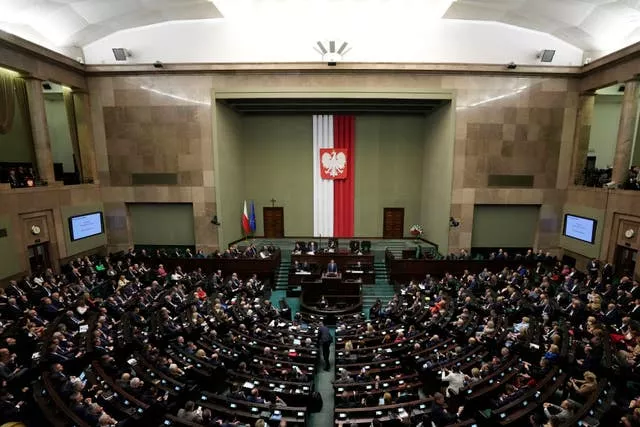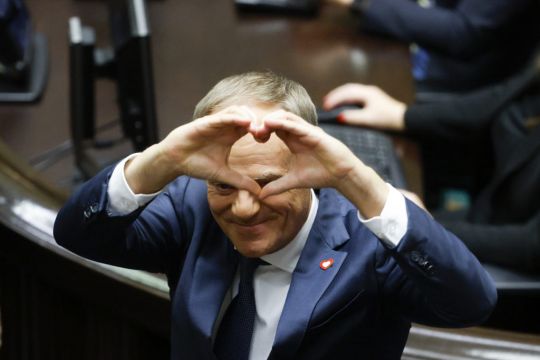Poland’s parliament elected centrist party leader Donald Tusk as prime minister on Monday, paving the way for a new pro-EU government after eight years of stormy national conservative rule.
Mr Tusk becomes prime minister nearly two months after a national election that was won by a coalition of parties ranging from left-wing to moderate conservative.
The parties ran on separate tickets but promised to work together under Mr Tusk’s leadership to restore democratic standards and improve ties with allies.

The vote was 248-201 in support of Mr Tusk in the 460-seat lower house of parliament, the Sejm, with no abstentions.
After Mr Tusk gave a short speech, the lawmakers rose to sing the national anthem.
Mr Tusk is scheduled to give a speech to parliament on Tuesday.
He will also present his Cabinet and face a vote of confidence for his new government.
He should then be sworn in by President Andrzej Duda on Wednesday.

The election of Mr Tusk comes after the former government of Prime Minister Mateusz Morawiecki’s government lost a confidence vote in parliament earlier on Monday.
The votes marked the ended of eight tumultuous years in which the national conservative Law and Justice party ruled the country with the support of many Poles — but at bitter odds with liberal Poles as well as the European Union and other Western allies.
Mr Tusk is expected to improve Warsaw’s standing in Brussels.
His leadership of the EU’s fifth largest member by population will boost centrist, pro-EU forces at a time when Eurosceptics, such as Geert Wilders in the Netherlands, are gaining strength.
The step-by-step power transition, coming nearly two months after Poles turned out in huge numbers to vote for change, was delayed for weeks by President Andrzej Duda, who kept his political allies in office as long as possible.
The change of power is felt as hugely consequential for the 38 million citizens of the central European nation, where collective anger produced a record-high turnout to replace a government that had been eroding democratic norms.
The election was won by a bloc of opposition parties ranging from left-wing to moderate conservative who ran on separate tickets but promised to work together to restore the rule of law.

Voters who opted for change, including many young Poles, were eager for the change of government to finally arrive, and the parliamentary proceedings have ignited widespread interest, leading to a spike in the number of subscribers to the Sejm’s YouTube channel.
Szymon Holownia, a former reality TV showman who leads a party allied with Mr Tusk’s, became the speaker of parliament last month and has been trying to encourage discipline in the sometimes raucous assembly.
A Warsaw cinema, which livestreamed Monday’s proceedings, drew hundreds of spectators who munched on popcorn and erupted in laughter as the outgoing prime minister spoke.
Justyna Lemanska, a young ad agency employee in the audience said: “So many disturbing things took place in the past eight years that I’m not surprised by this joy that it’s over.”
There is relief for many women who saw reproductive rights eroded and LGBTQ+ people who faced a government hate campaign that drove some to leave the country.
Law and Justice remains popular with many conservatives thanks to its adherence to traditional Catholic values, and the popularity of social spending policies.
The party lowered the retirement age and introduced cash payments to families with children while also increasing pension payments to the elderly.

Party leader Jaroslaw Kaczynski, the driving force in the country for the past eight years, lamented the fall of his government and said he feared for what comes next, possibly even “the end of democracy.”
Former president Lech Walesa, who was admitted to hospital last week with Covid-19 and remains weak, travelled from his home in Gdansk to attend the parliamentary session.
The anti-communist freedom fighter had despaired at what he viewed as the unravelling of democracy under Mr Kaczynski.
He appeared in parliament wearing a sweatshirt with the word “Constitution” — a slogan against Law and Justice.
As he appeared in a balcony with other dignitaries, many stood to applaud him, chanting his name.

Law and Justice representatives did not clap and remained seated.
Dealing with the implications of a war across Poland’s border in Ukraine will be among the challenges for the incoming government.
Mr Tusk plans to fly to Brussels for an EU summit later in the week for discussions critical to Ukraine’s future.
Hungarian Prime Minister Viktor Orban, Russia’s closest ally in the EU, is demanding that Ukraine’s membership in the EU and billions of euros in funding meant for the war-torn country be taken off the agenda.
Poland’s outgoing government was initially one of Kyiv’s strongest allies after Russia invaded Ukraine last year, but ties have worsened as economic competition from Ukrainian food producers and truckers has angered Poles who say their livelihoods are threatened.







